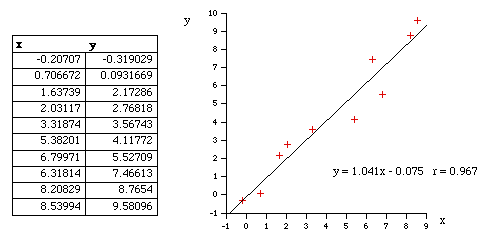
Linear Program Polynomial Interpolation 2d
Interpolation This chapter describes functions for performing interpolation. The library provides a variety of interpolation methods, including Cubic, Akima, and Steffen splines.
In mathematics, bilinear interpolation is an extension of linear interpolation for interpolating functions of two variables (e.g., x and y) on a rectilinear 2D grid. The key idea is to perform linear interpolation first in one direction, and then again in the other direction.
The interpolation types are interchangeable, allowing different methods to be used without recompiling. Interpolations can be defined for both normal and periodic boundary conditions. Additional functions are available for computing derivatives and integrals of interpolating functions.
Routines are provided for interpolating both one and two dimensional datasets. These interpolation methods produce curves that pass through each datapoint.
To interpolate noisy data with a smoothing curve see. The functions described in this section are declared in the header files gsl_interp.h and gsl_spline.h.
OutKast – Toilet Tisha [4:25] 22. OutKast – Slum Beautiful (ft. T-Mo Goodie, [4:41] 21. Outkast aquemini 320 rar.
1D Interpolation Functions The interpolation function for a given dataset is stored in a object. These are created by the following functions. Gsl_interp Workspace for 1D interpolation * gsl_interp_alloc (const * T, size_t size ) This function returns a pointer to a newly allocated interpolation object of type T for size data-points.
Int gsl_interp_init ( * interp, const double xa[], const double ya[], size_t size ) This function initializes the interpolation object interp for the data ( xa, ya) where xa and ya are arrays of size size. The interpolation object () does not save the data arrays xa and ya and only stores the static state computed from the data. The xa data array is always assumed to be strictly ordered, with increasing values; the behavior for other arrangements is not defined. Void gsl_interp_free ( * interp ) This function frees the interpolation object interp. 1D Interpolation Types The interpolation library provides the following interpolation types: gsl_interp_type gsl_interp_linear Linear interpolation.
This interpolation method does not require any additional memory. Gsl_interp_polynomial Polynomial interpolation. This method should only be used for interpolating small numbers of points because polynomial interpolation introduces large oscillations, even for well-behaved datasets. The number of terms in the interpolating polynomial is equal to the number of points. Gsl_interp_cspline Cubic spline with natural boundary conditions. The resulting curve is piecewise cubic on each interval, with matching first and second derivatives at the supplied data-points.
The second derivative is chosen to be zero at the first point and last point. Gsl_interp_cspline_periodic Cubic spline with periodic boundary conditions. The resulting curve is piecewise cubic on each interval, with matching first and second derivatives at the supplied data-points. The derivatives at the first and last points are also matched. Note that the last point in the data must have the same y-value as the first point, otherwise the resulting periodic interpolation will have a discontinuity at the boundary. Gsl_interp_akima Non-rounded Akima spline with natural boundary conditions. This method uses the non-rounded corner algorithm of Wodicka.
Gsl_interp_akima_periodic Non-rounded Akima spline with periodic boundary conditions. This method uses the non-rounded corner algorithm of Wodicka.
Gsl_interp_steffen Steffen’s method guarantees the monotonicity of the interpolating function between the given data points. Therefore, minima and maxima can only occur exactly at the data points, and there can never be spurious oscillations between data points. The interpolated function is piecewise cubic in each interval. The resulting curve and its first derivative are guaranteed to be continuous, but the second derivative may be discontinuous. The following related functions are available: const char * gsl_interp_name (const * interp ) This function returns the name of the interpolation type used by interp. 1D Index Look-up and Acceleration The state of searches can be stored in a object, which is a kind of iterator for interpolation lookups. Gsl_interp_accel This workspace stores state variables for interpolation lookups.